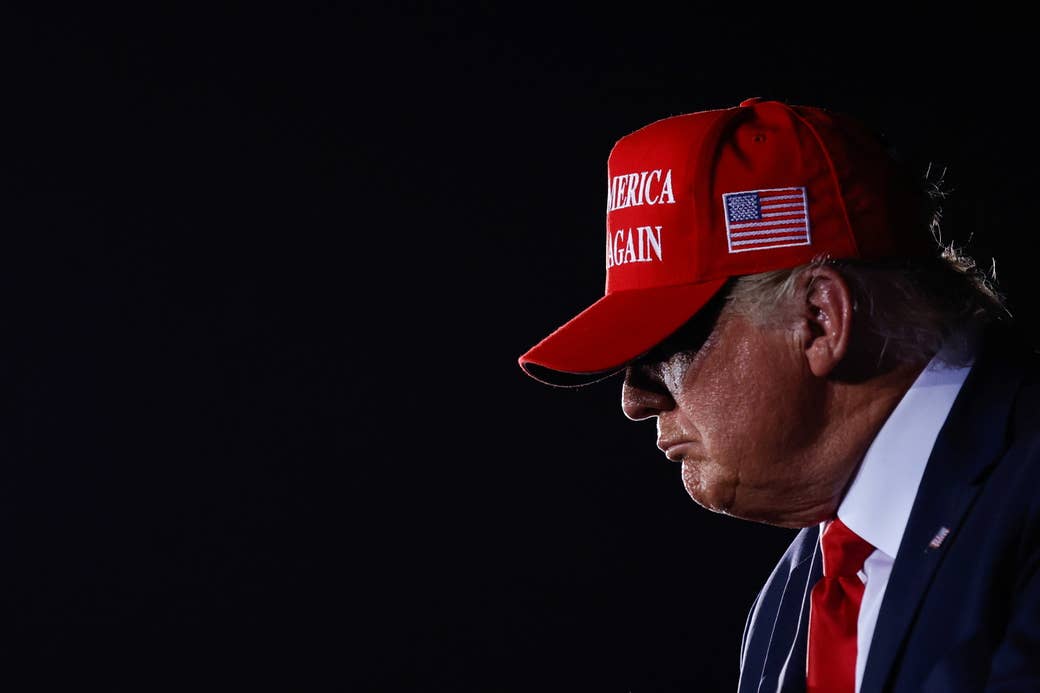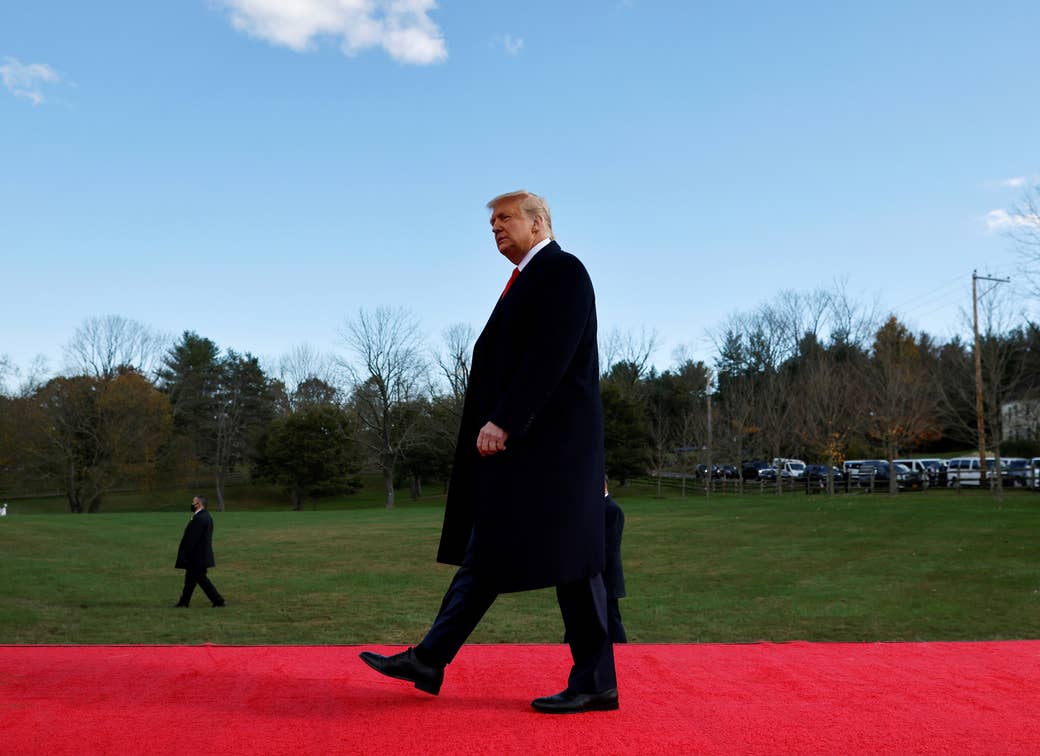
President Donald Trump, after a desperate last-ditch effort to discredit the results of the election through legal challenges and baseless charges of fraud, has lost his bid for reelection.
The president — who presided over the deaths of more than 236,000 Americans in a pandemic he had little interest in controlling, emboldened white nationalists, separated immigrant children from their families, and used the government in service of his personal grievances — lost his reelection to Joe Biden.
On election night, the president falsely claimed victory. Two days later, he doubled-down at a press briefing in the White House alleging a widespread conspiracy to steal the election from him, as he set out to undermine the election and democracy. Even as it became clear the president would not win reelection, the campaign’s counsel claimed Friday morning that “irregularities” throughout the voting process would somehow overturn projections of Trump’s loss in an official statement that began with “This election is not over.”
The president himself tweeted, “Philadelphia has got a rotten history on election integrity,” the same day. He and his campaign have not presented reasonable evidence to back any of that up.
At the moment the race was called, the president was golfing.
Trump may have lost, but the lasting effects of his presidency will be etched into the American psyche for years. He reshaped the judiciary for a generation, appointing more than 200 conservative judges — some rated "not qualified" — to the bench, including three Supreme Court justices. He presided over a tax cut for the wealthy in a time of rampant financial inequality, made worse by the coronavirus pandemic he failed to contain. He elevated dangerous conspiracy theorists and fringe racists. And he exposed the modern Republican Party as ripe for takeover by a single demagogue.
And the scale of Trump’s support, even in loss, shows that he and his brand of politics can’t be deemed a fluke; Trump won more votes than he did in 2016, and his appeal to so many Republican voters could make him a powerful figure for years to come.
Trump for weeks refused to say whether he would leave office peacefully if he lost while repeatedly attempting to suppress the vote and undermine the election results by making false claims that it would be rigged. In the final days of the campaign, he fueled election anxiety by suggesting a Supreme Court decision to allow late-arriving ballots in Pennsylvania, a key state, would create “bedlam in our country.” There were multiple new suits filed in Pennsylvania after Election Day, and the campaign asked to intervene in the Supreme Court case. Lawsuits the campaign filed in Michigan and Georgia after Election Day were dismissed. Trump vowed to fight on even after all the major networks called the race for Biden on Saturday, releasing a statement accusing Biden of "falsely posing" as the victor and promising to continue his campaign's legal battle.
His flagrant attempts to discredit the 2020 election were another example of his long-held pattern of denying reality — like how he insisted the nation was “rounding the corner” on COVID-19 up until the end of his campaign, even as roughly 1,000 Americans were dying every day.
Still, Trump continued to attract passionate support from his fervent base of supporters. Thousands upon thousands of people flocked to his rallies around the country, thrilled when he’d slam journalists, scientists, Washington elites, and foreign allies, tapping into a vein of white social and economic grievance. They are likely to remain a powerful political force for years, even as they shrink demographically, influencing the Republican Party from the far right.
At times during the campaign, Trump openly entertained the idea that he might lose, saying, “maybe I’ll lose because they’ll say I’m not a nice person,” and suggesting he might leave the country if defeated. That is unlikely. With more than 85 million Twitter followers and a penchant for shattering norms, he is likely to continue to seek the spotlight and the attention of his base.
He may not be quick to relinquish control of the GOP, with enough loyalists in charge of state parties to keep him empowered even out of elected office. And there’s always the possibility that he could choose to run for president again in 2024, when he’d be 78.
Trump’s loss comes after a chaotic four-year presidency in which he seemed far more comfortable campaigning than governing, and that was punctuated by a bevy of packed rallies during the worst pandemic in a century.
No one can say what’s next for the real estate scion and reality TV star who, as a newcomer to politics, disrupted the Republican Party and jettisoned its previous establishment, leaving behind a party in thrall to Trump-style politics, but which will now be without Trump himself officially at its helm.
It’s unclear if Trump’s children will take the reins of his populist political movement, which derives much of its power from the racial and economic grievances of working-class white voters. Donald Jr., Eric, Ivanka, and Tiffany all served as prominent campaign surrogates, signaling that the family may not be done with politics yet. His children have staked out different political niches, with Donald Jr. fashioning himself as the heir to his father’s crude “own the libs” ethos, and Ivanka presenting herself as the supposedly moderate, mainstream face of the family along with her husband, Jared Kushner.
The fate of the party is also in flux. An institution that once espoused Ronald Reagan–style small-government conservatism and social traditionalism is now the home of QAnon believers whom Trump emphatically endorsed, including Republican congressional candidates Laura Loomer and Marjorie Taylor Greene.

Throughout his presidency, Trump embraced conspiracy theories and emboldened racists. From his 2017 praise for white nationalist demonstrators in Charlottesville to his hard-edged rhetoric toward protests against systemic anti-Black racism and police brutality this year, Trump consistently signaled his affinity for the racist elements of his base. The Republican Party became progressively entwined with Trump himself over the last four years, to the point that it did not adopt a new platform at this year’s national convention, instead resolving that it “has and will continue to enthusiastically support the president’s America-first agenda.”
Despite his populist rhetoric, Trump often governed in line with traditional Republican priorities, like lowering taxes and building a conservative judiciary. And over the course of his administration, influential early advisers with more fringe views were weeded out, replaced gradually by more mainstream Republicans.
The coronavirus pandemic, which has now killed more than 232,000 Americans, proved to be the event that Trump’s presidency could not survive. He downplayed the virus from the beginning of the pandemic, even after contracting it himself in October. He ignored and belittled his administration’s public health officials and mocked mask-wearing and other preventative measures. After he was criticized for holding stadium-sized indoor rallies, Trump pivoted to massive outdoor rallies with largely maskless crowds, whom he referred to as “peaceful protesters,” against public health guidelines.
The pandemic also triggered an economic downturn that put 15% of Americans out of work. Trump made a deal with congressional Democrats to give stimulus money directly to unemployed workers and support small businesses earlier in the pandemic, but that bill, the CARES Act, ran out at the end of July. Trump failed to push through another coronavirus relief package before Election Day, denting his economic message.
There are also ramifications for ongoing legal cases. Trump has spent the past two years in court trying to stop the New York district attorney's office from enforcing a grand jury subpoena for eight years of his tax returns, a fight that remains pending after Election Day. Prosecutors haven't revealed the full extent of their criminal investigation, but it deals at least in part with hush money payments that Trump's former lawyer Michael Cohen orchestrated to give to two women who claimed to have had affairs with Trump, Stormy Daniels and Karen McDougal. During the first round of the legal fight, Trump unsuccessfully argued that, as a sitting president, he was immune from this type of criminal investigation. The US Supreme Court ruled against him in July. Trump tried to raise more legal challenges to the validity of the subpoena that are pending.
When Trump accepted his party’s nomination at the national convention in 2016, he painted a dark vision of America’s challenges and said, “I alone can fix it.” He didn’t. And voters didn’t give him another chance. ●
Zoe Tillman contributed reporting to this story.

